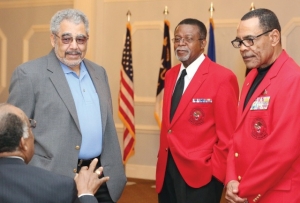Remembering Tuskegee heroes
By Kirsten Ballard
Published in News on March 19, 2015 1:46 PM

Left to right, Dick Lewis, keynote speaker Roy White, and Dr. Thomas Smith talk with county commissioner John Bell, bottom left, before the Tuskegee Airmen Heritage Luncheon held Wednesday.
"Lord, don't send me to Goldsboro," Roy C. White said to himself when he toured Seymour Johnson Air Force Base as a JROTC cadet.
"Lord, don't send me to Goldsboro," White said when he was stationed at the base in 1984.
He swore in three years he would have Goldsboro in his rearview mirror. On Wednesday, White was the guest speaker at the Seymour Johnson Air Force Base Tuskegee Airmen Heritage Luncheon at Eagle's Landing.
"You do the math," he said, laughing. "Every day, He shows me a reason why I'm here."
White works with youths in Goldsboro, trying to improve the lives of two young black men by giving them a strong male role model.
The Tuskegee Airmen were White's role models during his time in the service. He honored the African-American pilots who served in World War II. The Tuskegee Airmen were the first black pilots in the U.S. Armed Forces. Officially, they formed the 332nd Fighter Group and the 477th Bombardment Group.
In their time in service, they lost only 27 bombers, compared to the average of 47 losses. In 2007, they belatedly received the Gold Medal of Honor from George W. Bush.
"Thank you for remembering the men and women who paved the way for this beautiful nation," White said.
There are now only two remaining Tuskegee Airmen in North Carolina.
White talked about their motivation for joining-- one wanted to fly a plane for free and the other wanted to fight Hitler. He spoke about the segregation and oppression the airmen went through to achieve their dreams. They were subject to Jim Crow laws.
Retired Col. Chester Beverly honored the Tuskegee Airmen with his opening remarks.
He was one of 35 black men who went through Officer Candidate School. After 12 months of training, he was one of four left.
The three Tuskegee airmen he had as instructors provided a network of support for Beverly.
"If not for the Tuskegee Airmen, I would not have made it."
White urged the audience members to continue the work of the Tuskegee Airmen. He said he wants them to try new things and right wrongs.
"You have to go outside of your comfort zone to stay in touch with the world," he said. "There's nothing wrong with being afraid, it just needs to be temporary."
At the end of his speech, Chief Master Sgt. Jeffrey Craver presented White with an honorary plaque.
He thanked him for preserving the heritage of the Air Force, and spoke of the doors that the Tuskegee Airmen kicked down and ceilings they shattered to help pave the way for a diverse and strong Armed Forces.
"This room is full of people impacted by those men who wanted to serve equally and do their part," Craver said. "Today we stand on their shoulders, the shoulders of giants."
